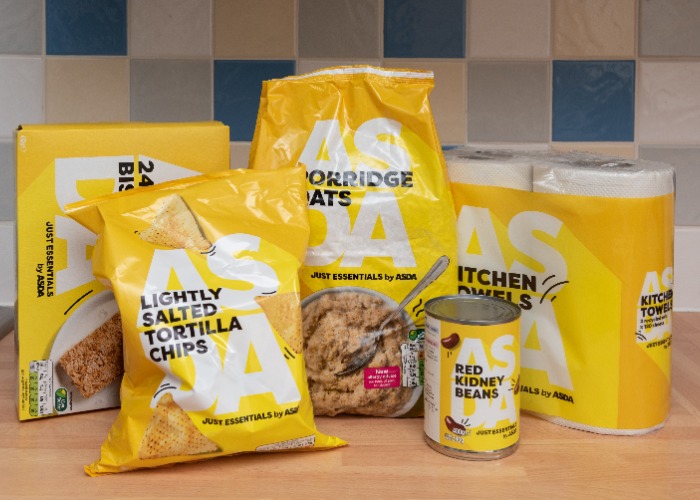Just Essentials: Asda price increases lead to shopper backlash

Having already rationed its new Just Essentials range, Asda has now increased prices on certain items as well.
Asda has been criticised this week by shoppers after hiking the cost of certain items within its Just Essentials range.
Just Essentials is Asda’s new ‘value’ range, meaning the pricing is supposed to be the most budget-friendly.
These are frill-free basic items ‒ you aren’t paying any extra for fancy branding or packaging.
However, the supermarket has come under fire for the pricing of the range.
For example, the Manchester Evening News reported that shoppers were unhappy that the price of the 500g packs of mince had been ratcheted up to £1.99, making it more expensive than other comparable value ranges from rival supermarkets.
Rationing products
It’s been something of an inauspicious start for the Just Essentials range, which was only launched back in May.
As we reported on loveMONEY, it has previously had to ration the range, limiting shoppers to only purchasing a maximum of three of any one Just Essentials product.
The supermarket promised this was only a temporary measure, and had been in response to the popularity of the range. Essentially, it was selling the Just Essentials items more quickly than it could bring them in, meaning the rationing was necessary.
It's possible this was a factor in the repricing of some of the Just Essentials items too ‒ you won’t sell them out quite as quickly, if they are less competitively priced than value ranges in other supermarkets.
@asda what's the deal with increasing the prices on your "just essentials" range? Thought it was supposed to there to help peasants like me with the cost of living? You've increased the price of the JE whole chicken by 99p! Bacon up by 10p. Piss taking at its finest! 😠
— Suzie (@shopaholicsuze) October 7, 2022
Saving cash at the supermarket
The popularity of the Just Essentials range shouldn’t come as a huge surprise, however.
The price that we pay at supermarkets for our grocery shopping has grown at a rate that is quite frankly terrifying.
The latest data from the Office for National Statistics (ONS) shows that in the 12 months to August the cost of food and non-alcoholic drinks has jumped by an eye-watering 13.1%, the fastest rate of inflation seen since August 2008.
While there has understandably been significant focus on the growing cost of energy and mortgage bills, the increased price we are paying for our food is not getting the same attention.
Yet it’s certainly being noticed by shoppers when we come to pay, which is why there’s evidently so much interest in money-saving schemes on offer, such as budget ranges.
Making the switch
Equally, plenty of shoppers are making a more dramatic decision by moving to a new supermarket entirely.
Kantar WorldPanel publishes data on the market share of each supermarket, and it makes for pointed reading at the moment.
The supermarkets that have seen their market share grow since Christmas are generally those seen as being more friendly on stretched budgets.
For example, Aldi’s market share has risen from 7.7% to 9.3%, making it now the fourth biggest supermarket in the country. Similarly, Lidl’s share has increased from 6.3% to 7.1%, while the Co-op’s has grown from 5.8% to 6.5%.
By contrast the big names, like Tesco, Sainsbury’s, Morrisons and Asda have all seen their share drop, most likely as shoppers look for more affordable rivals.
I need to spend less
Convenience always plays a part when it comes to supermarkets. In the past, shoppers may have been willing to put up with slightly higher prices if it meant an easier ‒ or at least shorter ‒ trip to the supermarket and back again.
However, the cost of that convenience is going to be a bigger concern for many of us now.
With such dramatic price rises ‒ and little sign that those price increases won’t continue for some time to come ‒ it’s ever more vital for shoppers to think carefully about ways to reduce the size of the bill at the checkout.
Sure, moving to a different supermarket can help, but there are other practical measures that will make a difference too, from sticking to a shopping list to making use of loyalty schemes.
Even shopping late in the day, when you can take advantage of discounts on fresh goods, will make a difference.
It’s likely that supermarkets will continue to launch new price promotions, with the aim of appealing to those of us trying to save a few pennies.
But those promotions will only succeed, and win our business, if they really do deliver savings, and we can actually take advantage of them without having to work our way past seemingly arbitrary limits.
Comments
Be the first to comment
Do you want to comment on this article? You need to be signed in for this feature